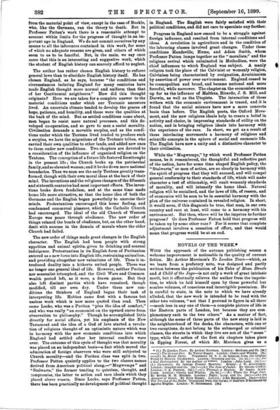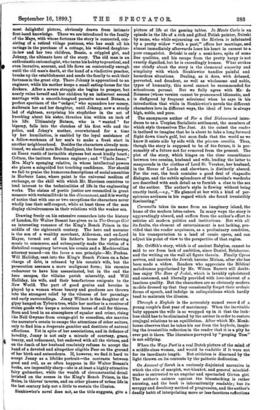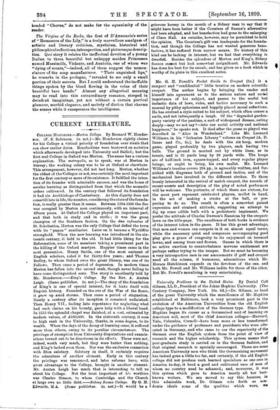NOVELS OF THE WEEK.*
WITH the approach of the autumn publishing season a welcome improvement is noticeable in the quality of current fiction. Mr. Arthur Morrison's To London Town—which, as we learn from a prefatory note, was designed and partly written between the publication of his Tales of Mean Streets and A Child of the Jago—is not only a work of great intrinsic merit, but it effectually relieves the author from the imputa- tion, to which he laid himself open by those powerful but sombre volumes, of conscious and incorrigible pessimism. He is careful to state, in the note to which we have already alluded, that the new work is intended to be read with the other two volumes, "not that I pretend to figure in all three —much less in any one of them—a complete picture of life in the Eastern parts of London, but because they are corn plementary each to the two others." As a matter of fact, although the scene of three parts of the new story is laid in the neighbourhood of the docks, the characters, with one or two exceptions, do not belong to the submerged or criminal classes, the streets in which they live are not of the " mean '' type, while the action of the first six chapters takes place in Epping Forest, of which Mr. Morrison gives us a • (1.) To London Town. By Arthur Morrison. London : Methuen and Co. [68.1 —(2.) The Ora nye Girl. By Walter Besant. London : Chatto and Windus. [6s.] —(S.) In Monte Carlo. Translated by S. C. de Soissons from the Original Polish by Henryk Slenklewlcz. London : Greening and Co. [2s. 61.)--(4.) For a God Dishonoured. By the Author of ..”°*. London : John Long. [6s.]— Caramella. By George Procter Bawtrey. Bristol : J. W. Arrowsmith. London : SluipkIn and Co. [6s.]—(6.) The Rose of Judah. By George Griffith. London : C. A. Pearson. [6s.)--(7.) Through a Keyhole. By Cosmo Monk- house. London : Chatto and WIndus. [Ss. 6d.]—(3.) Where the Ways Part By Bertha M. M. Milliken. London : Dlgbn. Long, and Co. (68.)--(9.) On Account of Sarah. Br Eyre Hussey. London : John MacQueen. The Virgins of the Roc*Ivi. Translated from the Italian of Gabriele D'Annunzlo by Agatha Hughes. Loudon W. Heinemann. [6s.j most delightful picture, obviously drawn from intimate first-hand knowledge. There we are introduced to the family of the Mays, with whose fortunes the story is connected, con- sisting of a retired village postman, who has sunk all his savings in the purchase of a cottage, his widowed daughter- in-law and her two children, Bessie, a crippled girl, and Johnny, the ultimate hero of the story. The old man is an enthusiastic entomologist, who tarns his hobby to practical, and even lucrative, account, and life flows on contentedly enough until the old man's death, at the hand of a vindictive poacher, breaks up the establishment and sends the family to seek their fortunes in the great city. There Johnny is apprenticed to an engineer, while his mother keeps a small eating-house for the dockers. After a severe struggle she begins to prosper, but nearly ruins herself and her children by an indiscreet second marriage with a smooth-tongued parasite named Batson, a perfect specimen of the "cadger," who squanders her money, maltreats her and her daughter, until Johnny, now a sturdy lad of eighteen, surprising his stepfather in the act of knocking about his sister, thrashes him within an inch of his life. Ultimately Batson, who is " wanted " for bigamy, falls into the clutches of his first wife and the police, and Johny's mother, overwhelmed for a time by her humiliation, is enabled by the loyal assistance of a fellow-workman of her son's to make a fresh start in another neighbourhood. Besides the characters already men- tioned, we should note Bob Smallpiece, the forest gamekeeper, an Essex rustic of invincible shyness but most kindly heart ; Cottam, the taciturn foreman engineer ; and " Uncle Isaac," Mrs. May's sponging relative, in whose intellectual powers she places a misguided but touching confidence. Nor should we fail to praise the humorous descriptions of social amenities in Harbour Lane, where paint is the universal medium of exchange, or the skill with which Mr. Morrison contrives to lend interest to the technicalities of life in the engineering works. The claims of poetic justice are reconciled in great measure with verisimilitude in the djnouement, and it is worthy of notice that with one or two exceptions the characters never wholly lose their self-respect, while at least three of the men display chivalrousness in their relations with the weaker sex.
Drawing freely on his extensive researches into the history of London, Sir Walter Besant has given us in The Orange Girl an interesting romance of the King's Bench Prison in the middle of the eighteenth century. The hero and narrator is the son of a wealthy merchant, Alderman, and ex-Lord Mayor, turned out of his father's house for preferring music to commerce, and subsequently made the victim of a diabolical conspiracy between his cousin and a Machiavellian attorney named—on the /aces a non principle—Mr. Probus. Will Halliday, cast into the King's Bench Prison on a false charge of debt, is released by his cousin's wife, but the persecution assumes a more malignant form ; his enemies endeavour to have him assassinated, but in the end the hero escapes, the villains perish miserably, and Will Halliday, his wife, and their benefactress emigrate to the New World. The part of good genius and heroine is played by a woman whose beauty and goodness are thrown into the strongest relief by the vileness of her parentage and early surroundings. Jenny Wilmot is the daughter of a gipsy hanged on Tyburn tree, while her mother is a receiver of stolen goods who keeps a notorious house of call for thieves. Born and bred in an atmosphere of squalor and crime, rising like Nell Gwynne from orange-girl to comedian, she marries the narrator's cousin to escape the attentions of other suitors, only to find him a desperate gambler and destitute of natural affections. Yet in spite of her associations, and in defiance of heredity, Jenny is not only a miracle of courtesy, grace, beauty, and refinement, but endowed with all the virtues, and on the death of her husband resolutely refuses to accept the hand of a devoted and altogether eligible Peer on the ground of her birth and antecedents. If, however, we find it hard to accept Jenny as a lifelike portrait—the contrasts between good and evil, as so often happens in Sir Walter Besant's books, are impossibly sharp—she is at least a highly attractive fairy godmother, while the wealth of circumstantial detail lavished on the scenes in the King's Bench Prison, in the Rules, in thieves' taverns, and on other phases of urban life in the last century help not a little to sustain the illusion.
Sienkiewicz's novel does not, as the title suggests, give a picture of life at the gaming tables. In Monte Carlo is an episode in the life of a rich and gifted Polish painter, Svirski by name, who while sojourning on the Riviera is infatuated by a pretty widow "with a past," offers her marriage, and almost immediately afterwards loses his heart in earnest to a poor compatriot. Svirski is only a semi-hero, spite of some fine qualities, and his escape from the pretty harpy is not exactly dignified, but he is exceedingly human. What strikes one chiefly about the story is the elemental sincerity and simplicity with which Sienkiewicz handles painful and hazardous situations. Dealing, as it does, with debased, perverted, and decadent, as well as wholesome and noble, types of humanity, this novel cannot be recommended for schoolroom perusal. But we fully agree with Mr.. de Soissons (whose version cannot be pronounced idiomatic, and is disfigured by frequent solecisms) when be says in his introduction that while in Sienkiewicz's novels the different characters love in different ways, the ideal of love is always high, noble, and pure.
The anonymous author of For a God Dishonoured intro- duces to us a Utopian Socialistic settlement, the members of which style themselves The Just. At the outset the reader is inclined to imagine that he is about to take a long forward flight down time's gulf, but soon finds that the world as we know it exists side by side with the piorum concilia. Thus, though the story is supposed to be of the future, it is pre- sumably of a future not far removed from the present. The plot of the story, which hinges on the close resemblance between two cousins, husband and wife, leading the latter to masquerade in the clothes of Lord St. Vereker, her husband, in the House of Lords and elsewhere, is distinctly absurd. For the rest, the book contains a good deal of rhapsodic dialogue, and the subtle splendours of the heroine's wardrobe are described with such detail as to furnish a clue to the sex of the author. The author's style is flowing without being exactly lucid,—e.g., " He glanced at her with a kind of per- spicuous archness in his regard which she found irresistibly fascinating."
Caramella takes its name from an imaginary island, the home of the modern lotus-eaters. In many ways the story is aggravatingly absurd, and suffers from the author's effort to satirise all modern politics and institutions. But with all its faults, the element of entertainment is not lacking, pro- vided that the reader acquiesces, as a preliminary condition, in his transportation to a land of comic opera, and can adjust his point of view to the perspective of that region.
Mr. Griffith's story, which is of ancient Babylon, cannot be said to err from lack of ambition, since Daniel, Belshazzar, and the writing on the wall all figure therein. Finally Cyrus arrives, and marries the Jewish heroine Miriam, after she has been made a widow. Readers who appreciate the Biblical melodramas popularised by Mr. Wilson Barrett will doubt- less enjoy The Rose of Judah, which is lavishly upholstered and costumed, and liberally provided with love-interest of a luscious quality. But the characters are so obviously modern models dressed up that they occasionally forget their archaic forms of speech, and indulge in colloquialisms which hardly tend to maintain the illusion.
Through a Keyhole is the accurately named recor d of a young couple's first year of matrimony. When the inevitable baby appears the wife is so wrapped up in it that the luck- less child has to be eliminated by the author in order to restore conjugal relations to an equilibrium. After which Mr. Monk- house observes that he takes his ear from the keyhole, inspir- ing the irresistible reflection in the reader that it is a pity he ever put it there. The literature purveyed by " peeping Tom" is not edifying.
Where the Ways Part is a real Dutch picture of the mind of a middle-class woman, and would be readable if it were not for its inordinate length. But criticism is disarmed by the light thrown on its contents by the pathetic dedication.
On Account of Sarah is a curiously disjointed narrative in which the role of marplot, wet-blanket, and general mischief- maker is entrusted to an annular and spectacled Girton girl. The author's animus against the bluestocking is rather amusing, and the book is intermittently readable ; but its scrappy and desultory method of progression, and the author's deadly habit of interpolating more or less facetious reflections
headed " Chorus," do not make for the equanimity of the
reader.
The Virgins of the Rocks, the first of D'Annunzio's series of " Romances of the Lily," is a truly marvellous amalgam of artistic and literary criticism, mysticism, historical and philosophical reflections, introspection, and picturesque descrip- tion. Quri. story it relates the ineffectual devotion of a young Italian to three beautiful but unhappy maiden Princesses named Massimilla, Violante, and Anatolia, one of whom was "dying of scents,"—indeed, all of them suggest the nomen- clature of the soap manufacturer. "Their anguished lips," he remarks in the prologue, " revealed to me only a small portion of their secrets. But I could understand the ineffable things spoken by the blood flowing in the veins of their beautiful bare hands." Almost any allegorical meaning may be read into this extraordinary romance, steeped in decadent imaginings, yet not without a certain poetical glamour, morbid elegance, and melody of diction that charms the senses while it exasperates the intelligence.




































 Previous page
Previous page